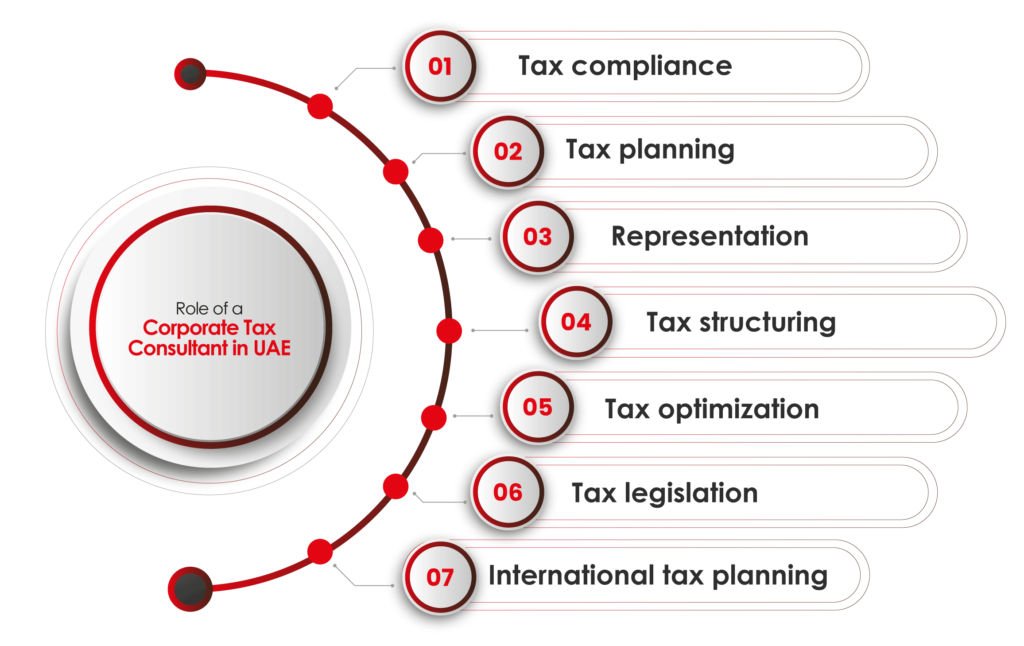Approved by Federal Tax Authority (FTA)
- Mon - Fri: 8:00 am - 6:00 pm
Corporate Tax Registration
Corporate Tax Registration
Corporate Tax Registration in the UAE is required for businesses operating in the country that generate taxable income under the new UAE Corporate Tax Law. Entities must register for the corporate tax to comply with the Federal Tax Authority’s regulations. The procedure for corporate tax registration in the UAE involves submitting key documents, including trade license details, financial statements, and tax period information. All businesses, whether they are Resident Juridical Persons with licenses, foreign entities, or natural persons engaged in business activities, should register with the Federal Tax Authority. The corporate tax rate is determined by the UAE’s tax framework, and businesses must ensure timely and accurate registration to avoid penalties.
Failure to register for the corporate tax may result in non-compliance, as businesses operating in the UAE are legally required to register and adhere to the tax guidelines. Documents required for corporate tax registration must be submitted in accordance with the specific requirements set forth by the Federal Tax Authority, ensuring that the business is properly controlled in the UAE’s competitive market.
Who Needs to Register for Corporate Tax in the uae?
Under the UAE’s Corporate Tax regime, businesses operating in the country that generate taxable income need to register for corporate tax to comply with the Federal Tax Authority’s regulations. This registration is crucial to file their corporate tax returns and ensure timely compliance with tax obligations. Free zone businesses that do not meet the exemption criteria are also required to register for corporation tax.
Legal Entities Required for Corporate Tax Registration
All legal entities engaged in business activities within the UAE are required for corporate tax registration. This includes Resident Juridical Persons with licenses, companies based in the mainland, foreign entities operating in the UAE, and businesses based in free zones. Whether you’re a small startup or a large corporation, if your business generates taxable income, you must complete your registration with the Federal Tax Authority.

Entities that engage in activities like banking, real estate, and natural resource exploitation, and those with significant tax liabilities, must register company for tax to ensure compliance with UAE’s corporate taxation laws. Companies are also required to file tax returns on time, avoiding penalties and ensuring that all tax obligations are met.
Corporate Tax Services
Many businesses seek accounting & tax consultancy services to ensure they properly navigate the corporate tax regime in the UAE. These tax services can help businesses understand how to file tax returns, manage tax liabilities, and resolve any issues that may arise through the tax dispute system. If you are unsure about how to register for UAE corporate tax, it’s advisable to consult professionals who can guide you through the process to ensure your business complies with all legal requirements and remains tax-efficient in the competitive UAE market.
Step-by-Step Guide to Corporate Tax Registration on EmaraTax
Creating an EmaraTax Account
To begin the UAE corporate tax registration process, you must first create an account on the EmaraTax portal. This platform is essential for managing all your tax-related tasks, including corporate tax in the UAE, business tax clearance registration, and corporate tax registration services. During the registration process, you will need to provide key details such as your company’s legal name, taxable person status, and business type. These details are necessary to confirm whether your business is subject to corporate tax under the corporate tax law.
Filling Out the Registration Form
Once your EmaraTax account is active, complete the registration application. Ensure you provide accurate information about your business activities, including whether you are a juridical person or a natural person engaged in business. You will also need to indicate any foreign jurisdiction details that apply to your business. This step is critical to meet the requirements for corporate tax registration in UAE and to ensure compliance with tax laws. Filling out all mandatory fields correctly will help avoid delays in the corporate tax registration process.
Submitting Documentation
After completing the registration form, submit the necessary documentation to the EmaraTax platform. This includes your trade license details, corporate tax return information, and any supporting financial documents such as annual accounts that reflect taxable income. It is important to include business operations information and relevant documents such as profit and loss statements, which are essential for accurate corporate taxes assessment. Failing to submit the right documentation could delay the process or lead to non-compliance.
Finalizing Registration
Once you have submitted all the required details and documentation, review everything carefully before submitting it for final processing. You will then receive confirmation from the Federal Tax Authority that your business is officially registered for corporation tax registration. Keep in mind that the deadline for business in the UAE to register for UAE corporate tax is crucial, and businesses must register for corporate tax to avoid penalties. The tax registration process will also enable your business to manage its tax rate efficiently and ensure tax is applicable according to your company’s operations.
If needed, consult an accountant and tax consultant to guide you through the tax registration in the UAE and help you complete the corporate tax registration accurately. Whether you’re setting up a real estate tax company, registering a Dubai company tax rate, or seeking corporate legal services for tax matters, having expert advice can ensure your business meets all necessary compliance requirements for corporate tax in the UAE.
Once your corporate tax registration is complete, you can also access ongoing compliance services through the EmaraTax portal, ensuring that your business remains in good standing with the Federal Tax Authority.
Corporate Tax Registration Timeline
Essential Documents for Legal Entities
For legal entities, the following documents are required for corporate tax registration:
- Trade license details
- Entity details such as company name, registration number, and structure
- Contact details, including a valid company address
- Financial statements reflecting the taxable income of the company
- Banking operations documentation, including bank account details
- Relevant tax period information
Natural persons operating businesses in the United Arab Emirates must provide the following documentation as part of the registration process for corporate tax UAE:
Identification Details: This includes a national ID or passport for identity verification purposes. This is a mandatory requirement for all natural persons looking to register with the FTA (Federal Tax Authority) for corporate tax in the UAE.
Commercial License Details: If the individual is registered as a sole proprietor, they must provide their commercial license details to show they are legally authorized to operate a business in the UAE. This is particularly important for those wishing to set up a limited company and register for corporation tax.
Proof of Taxable Income or Financial Records: Tax period information, along with financial records or proof of taxable income, must be submitted. This could include profit and loss statements or other financial documents that reflect business activities and income generated. This is essential for tax filing and ensuring that the business is accurately assessed for corporate tax UAE.
For individuals in free zone areas, the documentation requirements may vary, depending on the specific free zone regulations. Free zone persons are also required to follow the same corporate tax registration guidelines but may have unique exemptions or incentives to consider.
If you’re unsure about how to register for UAE corporate tax in EmaraTax, you can consult with corporate tax consultants in Abu Dhabi or use register for corporation tax services to guide you through the EmaraTax registration process. Seeking professional support will help ensure that all the required documentation is submitted correctly and in compliance with the UAE government regulations, including any regulatory compliance in Dubai that may apply to your business.
Once you have submitted your documentation and completed the corporate tax registration, the FTA will confirm your registration, ensuring your business is compliant with corporate tax UAE requirements.


Implications for Businesses in Free Zones
Tax Exemptions in Free Zones
Many businesses operating in free zones in the UAE enjoy tax exemptions for a specified period. These exemptions can significantly reduce corporate tax liabilities for businesses, but it is important to note that these businesses are still required to register for corporate tax and must register corporate tax annually to maintain compliance with tax regulations. Even if a business benefits from exemptions, it must submit its tax return each year to ensure it adheres to the evolving tax regime in the UAE.
Compliance Requirements for Free Zone Entities
Free zone businesses, like other entities operating in the UAE, are required to register for corporation tax online services and submit corporate tax registration applications to the Federal Tax Authority. These businesses must comply with certain regulatory standards, including filing annual tax returns and maintaining tax transparency. It’s essential for businesses operating in the UAE, including those in free zones, to stay up-to-date on changes in the corporate tax regime to ensure they meet the relevant tax requirements and retain their exempt status.
Free zone businesses should also seek guidance from corporate tax consultants to ensure they are not only compliant but also benefit from cost-effective tax planning. For example, businesses in Sharjah may take advantage of tax planning in Umm Al Quwain, while those in Dubai can access comprehensive corporate services in UAE to optimize their company income tax registration process and future tax planning.
In addition, businesses should consider using a corporate tax calculator to estimate their potential tax liabilities. For more detailed support, tax registration services in Dubai can assist businesses in ensuring that they follow the correct company tax registration steps and understand their tax liabilities under the UAE’s tax laws. Whether you’re setting up a Dubai corporate registry or need assistance with corporation tax registration, consulting with experienced corporate tax advisors will help your business navigate the complexities of the tax registration services and remain compliant with UAE tax laws.
Penalties for Late Registration
Financial Implications
Failure to meet the tax compliance deadlines can result in substantial financial penalties. These penalties increase based on the length of delay and amount of unpaid taxable income.
Legal Consequences
In addition to financial penalties, failure to complete corporate tax registration or corporate tax return submissions may result in legal actions or audits by the Federal Tax Authority.
When it comes to managing your corporate tax obligations and completing the corporate tax registration in the United Arab Emirates, Tulpar Global Taxation is your trusted partner. From initial consultation to ongoing filing, our in-depth understanding of Corporate Tax in UAE Offerings enables us to provide the necessary guidance and support, allowing you to concentrate on what matters most—growing your business. Learn more about corporate TAX i.e. Corporate Tax Planning | Corporate Tax Return Submission | Corporate Tax Consultancy.
PARTNER WITH TULPAR GLOBAL TAXATION
To navigate the complexities of corporate tax registration and ensure compliance with UAE tax laws, consider partnering with Tulpar Tax Corporate and Legal Services Ltd. As experts in corporate tax services, Tulpar Tax can guide your business through the corporate tax registration process, ensuring accurate and timely submissions. With their in-depth knowledge of the federal decree-law and UAE tax planning strategies, you can avoid common mistakes, maximize tax incentives, and stay compliant with all relevant tax obligations. Whether you’re a Resident Juridical Person, Non-Resident Person, or a foreign entity, Tulpar Tax offers customized solutions to help you register a company for income tax and handle company tax clearance registration. Businesses must register with the FTA (Federal Tax Authority) to obtain their tax registration number and start filing tax returns for their first tax period.
Tulpar Tax provides comprehensive company professional tax registration services, assisting businesses with all the documents required for corporate tax registration, such as trade licenses, financial records, and details about taxable income. They also support businesses looking to set up a limited company and register for corporation tax or those needing help with company tax agent registration. For companies in the UAE, staying informed about the steps to register for corporate tax is critical. Businesses will need to understand when the relevant tax period begins and how to manage tax payments. If you’re wondering how to register a company for corporate tax in UAE, Tulpar Tax can walk you through the entire process, including completing the EmaraTax registration and obtaining your corporate tax registration number.
With corporate service providers in UAE, businesses can also ensure they meet all the necessary compliance requirements, from corporation tax register online to managing ongoing corporate tax return filings. Partnering with Tulpar Tax ensures that your business stays on track, avoids penalties, and makes the most of the best corporate tax solutions available in the UAE. If you need assistance with tax strategy or navigating the registration requirements, Tulpar Tax provides expert tax advisor services that simplify your tax filing obligations and help your business thrive in the competitive UAE market.
Let Tulpar Global Taxation be your trusted partner in corporate tax registration and filing services—secure, efficient, and tailored to your business needs! Contact Us Now.


